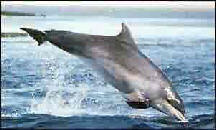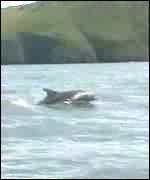|
There are 130 dolphins in the colony
The dolphins live in colder waters than
any others and are the most northerly
colony on Earth. The UK's only other
resident dolphins live in the waters of
Cardigan Bay, off West Wales, although
they are visitors to inshore waters round several parts of the British Isles.
Northern Constabulary said they were concerned at the effect of comparatively small illegal nets used by salmon poachers, which are difficult for dolphins to see.
Force wildlife liaison officer Inspector John Grierson said: "The main threat to the dolphins is them getting caught in poacher's nets - why should dolphins suffer because of their greed?
Population is dwindling
"We are down to 130 dolphins in the Firth and there has been research over the past few years that has said that the population is dwindling.
"Just catching a female dolphin out of that population could have dire consequences.
"What happens is that the dolphin chase salmon, the salmon can't see the nets and neither can the dolphin, and the dolphin gets caught and basically drowns."
At the launch, police officers handed out posters and leaflets which showed how the public can help in the campaign.
Seized illegal nets were also on display.
The launch formed part of the Partnership for Action Against Wildlife Crime, a body comprising representatives from organisations involved in wildlife law enforcement in the UK, including the Scottish Executive, local fisheries boards and Scottish Natural Heritage.
|

